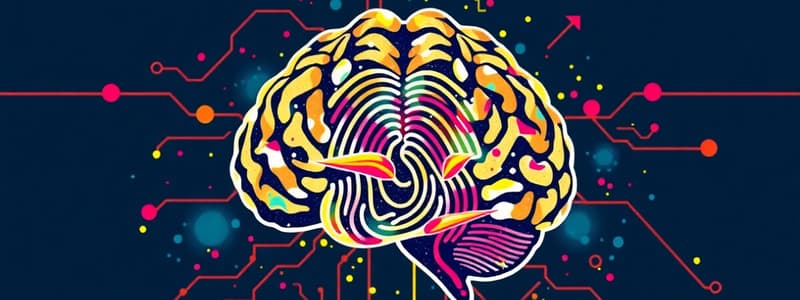Podcast
Questions and Answers
What distinguishes brain fingerprinting from traditional identification methods?
What distinguishes brain fingerprinting from traditional identification methods?
- It measures objective brain activity directly. (correct)
- It requires physical contact with the subject.
- It relies on subjective reports from witnesses.
- It uses coerced confessions as the primary evidence.
What is the accuracy range of brain fingerprinting demonstrated in various studies?
What is the accuracy range of brain fingerprinting demonstrated in various studies?
- 70% to 80%
- 60% to 70%
- 90% to 100%
- 80% to 90% (correct)
In what context can brain fingerprinting be applied for market research?
In what context can brain fingerprinting be applied for market research?
- To assess emotional well-being of consumers.
- To collect personal data without consent.
- To determine potential job candidates.
- To understand consumer preferences through brain responses. (correct)
Which of the following is NOT a potential application of brain fingerprinting?
Which of the following is NOT a potential application of brain fingerprinting?
Why is brain fingerprinting considered a more humane method of identification?
Why is brain fingerprinting considered a more humane method of identification?
Which type of memory does brain fingerprinting analyze?
Which type of memory does brain fingerprinting analyze?
How can brain fingerprinting aid in counterterrorism efforts?
How can brain fingerprinting aid in counterterrorism efforts?
What is a significant limitation of eyewitness testimony compared to brain fingerprinting?
What is a significant limitation of eyewitness testimony compared to brain fingerprinting?
Which of the following best describes the approach of brain fingerprinting in education?
Which of the following best describes the approach of brain fingerprinting in education?
What is a critical difference between brain fingerprinting and polygraph testing?
What is a critical difference between brain fingerprinting and polygraph testing?
Flashcards are hidden until you start studying
Study Notes
Brain Fingerprinting: An Innovative Approach
- Brain fingerprinting is a method of detecting concealed information in the brain by analyzing brain wave patterns.
- It's more objective than traditional methods like eyewitness testimonies and confessions.
- Brain fingerprinting uses objective measurements of brain activity.
- It's more reliable than traditional methods because it's based on measuring brain activity and not subjective accounts.
- Studies show high accuracy rates ranging from 80% to 90%.
- Brain fingerprinting can identify perpetrators even if they are unaware of committing the crime.
- It measures unconscious memories stored in the brain, not conscious ones.
- It's a non-invasive technique, meaning it doesn't involve any physical contact with the subject, making it more humane than polygraph testing.
Applications of Brain Fingerprinting
- National Security: Detecting individuals with knowledge of sensitive information or potential threats in security screenings.
- Market Research: Understanding consumer preferences and reactions to advertisements, products, or services by measuring brain responses.
- Medical Diagnosis: Potentially used for diagnosing medical conditions or disorders by analyzing brainwave patterns associated with specific symptoms.
- Education: Assessing learning outcomes, memory retention, and cognitive processes in students.
- Employee Screening: Verifying knowledge of company policies, confidential information, or compliance with regulations.
- Counterterrorism: Identifying individuals with knowledge of terrorist activities or plans to prevent potential threats.
Brain Fingerprinting: A Revolution in Forensic Science and Beyond
- Brain fingerprinting was developed by Dr. Lawrence Farwell.
- Its impact reaches beyond criminal investigations, revolutionizing forensic science and security measures.
- It offers a unique way to detect concealed information in the brain with high accuracy.
- The technology has wide-ranging applications across various fields, providing an accurate method to uncover hidden knowledge stored in the brain.
Studying That Suits You
Use AI to generate personalized quizzes and flashcards to suit your learning preferences.




